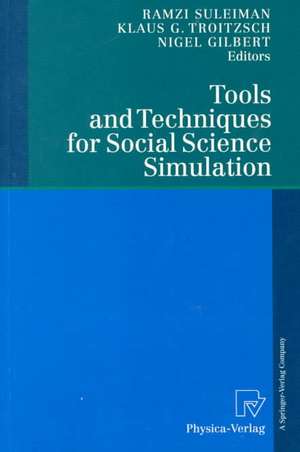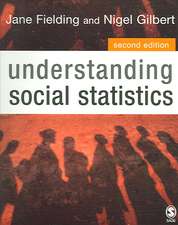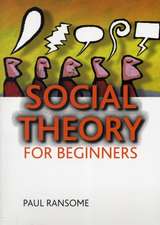Tools and Techniques for Social Science Simulation
Editat de Ramzi Suleiman, Klaus G. Troitzsch, Nigel Gilberten Limba Engleză Paperback – 11 feb 2000
Preț: 645.28 lei
Preț vechi: 759.15 lei
-15% Nou
Puncte Express: 968
Preț estimativ în valută:
123.47€ • 129.26$ • 102.17£
123.47€ • 129.26$ • 102.17£
Carte tipărită la comandă
Livrare economică 07-21 aprilie
Preluare comenzi: 021 569.72.76
Specificații
ISBN-13: 9783790812657
ISBN-10: 379081265X
Pagini: 396
Ilustrații: VIII, 387 p.
Dimensiuni: 155 x 235 x 21 mm
Greutate: 0.55 kg
Ediția:Softcover reprint of the original 1st ed. 2000
Editura: Physica-Verlag HD
Colecția Physica
Locul publicării:Heidelberg, Germany
ISBN-10: 379081265X
Pagini: 396
Ilustrații: VIII, 387 p.
Dimensiuni: 155 x 235 x 21 mm
Greutate: 0.55 kg
Ediția:Softcover reprint of the original 1st ed. 2000
Editura: Physica-Verlag HD
Colecția Physica
Locul publicării:Heidelberg, Germany
Public țintă
ResearchCuprins
I Simulations as Tools for Modelling and Theory Building.- 1 Models, Processes and Algorithms: Towards a Simulation Toolkit.- 2 Questions in the Methodology of Artificial Societies.- 3 Computer Assisted Interfacing: On the Use of Computer Simulation for Theory Construction.- 4 Interactive Neural Networks as Tools for Modeling Social Systems.- II Multi-Agent Based Simulations.- 5 SMASS: A Serial Multi-Agent System for Social Simulion.- 6 PECS: A Reference Model for the Simulation of Multi-Agent Systems.- 7 Bedrock: Building Multi-Agent Simulation Applications.- 8 Diversity in Strategies of Partnership Formation.- III Game Theory and Cellular Automata.- 9 Cellular Automata Models as a Modelling Tool.- 10 Evolution of Learning Rules in Space.- 11 Maintaining Diversity: Simulating the Role of Nonliniarity and Discreteness in Dynamic Social Impact.- 12 Representation Methods and the Emergence of Inter-Group Cooperation.- IV Sensitivity Analysis.- 13 Sensitivity Analysis in the Social Sciences: Problems and Prospects.- 14 Tests of Dynamic Social Models with Time Related Surveys: an Experimental Approach.- 15 What Is the Use of Gossip? A Sensitivity Analysis of the Spreading of Respectful Reputation.- V Applications.- 16 Modelling Greening Investors: Economic Development, Opinion Formation, and Technological Change in a Multilevel Simulation Model.- 17 Microsimulating Farm Business Performance.- 18 Ordering Parameters in the Rule Space of Social Systems.- Biographical Sketches.- Author Index.









